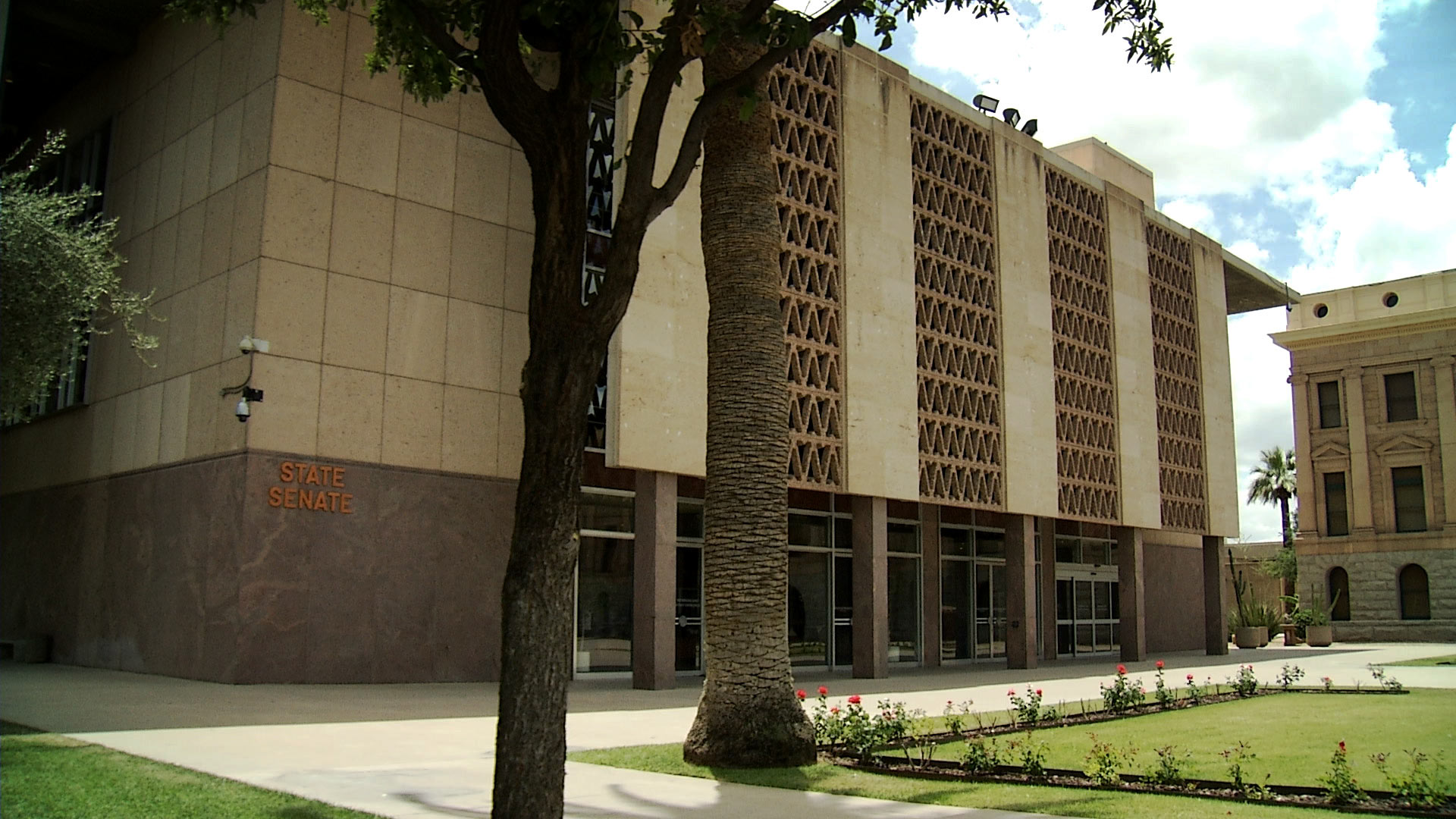 The outside of the State Senate building at the Capitol in Phoenix.
The outside of the State Senate building at the Capitol in Phoenix.
Arizona’s Senate approved a repeal of the state’s near-total abortion ban after two Republicans crossed party lines to side with Democrats.
“Arizonans have been begging the legislature to take actions since the Supreme Court’s ruling on April 9,” Democratic Senator Anna Hernandez, who brought the bill forward, said. “While today was a step towards ensuring our right to choose and protecting our access to abortion in Arizona, this is not the end. We must continue to fight until our rights are guaranteed in the constitution.”
The move comes after a contentious few weeks at the Capitol following the Arizona Supreme Court’s ruling to enforce the Civil War-era law. That law, which was first enacted in 1864 before Arizona was a state, bans all abortions, except to save the life of a pregnant person. There are no exceptions for rape or incest.
Governor Katie Hobbs said she will sign the bill on Thursday afternoon.
“I’m glad to see the Senate answered my call and voted to repeal the 1864 total abortion ban,” Hobbs said on social media. “While this is essential to protecting women’s health, it is just the beginning. I will never stop fighting for women’s reproductive freedoms.”
Republican Senators Shawnna Bolick and T.J. Shope both voted to repeal the ban. Shope is the chamber's President Pro Tempore. Bolick is married to Arizona Supreme Court Justice Clint Bolick, who voted to allow the 1864 ban to take effect.
Their Republican colleagues were openly critical of the decision to cross party lines and vote to repeal the ban.
“Our Democrat colleagues–who are very good at sticking together…almost always they vote together,” Republican Senator David Farnsworth said. “Unfortunately, on this side of the aisle, we are not so good at doing that.”
“Republicans are abandoning the Founding Fathers' principles, and our Republican party platform’s principles to join with Democrats to expedite a near-total repeal,” Republican Senator Jake Hoffman said. “It is disgusting that this is the state of the Republican party today.”
Bolick defended her affirmative vote in a 25-minute explanation that detailed stories regarding difficult pregnancies. It was not until later in her speech that she said those stories were about her own abortion after experiencing a miscarriage.
“I know the chronicles of these pregnancies quite intimately because they're all my own and my family lived and survived each one of them, including my miscarriage,” Bolick said. “Having a D & C my first trimester because the baby wasn't viable was very tough. Would Arizona’s pre-Row law have allowed me to have this medical procedure, even though at the time my life was not in danger? One pro-life individual who recently reached out to me even wrote, is there a definition for unless it is necessary to save her life, she asked me. Maybe medical doctors could weigh in. Maybe, I don't know.”
In the end, Bolick criticized a proposed ballot measure that would codify abortion access up until 24 weeks.
“Very little legislation written and signed into law is ever perfect. Until we have a better choice in this matter. I side with saving more babies' lives. I want to protect our state constitution from unlimited abortions.”
Shortly after Bolick explained her vote, other Republican senators like Tucson’s Justine Wadsack criticized her vote. Wadsack also detailed her own miscarriage experience.
“God chose when that heartbeat was going to stop,” Wadsack said. “It is not my job as a state senator to determine when a child’s heart stops beating.”
Five legislative Republicans voted to repeal the law in the two chambers, including Representatives Tim Dunn, Matt Gress, and Justin Wilmeth.
When the bill is signed by Governor Hobbs, it will not go into effect until 90 days after the legislature closes its regular session. Most years that means bills will not go into effect until late summer or early fall. That means pregnant Arizonans may still face a time when abortion is restricted. Right now, the ban is set to take place on June 27.
However, House Assistant Minority Leader, Representative Oscar De Los Santos told AZPM News that Democrats will continue to go through the courts to delay the implementation.
“Our hope is that the courts will enjoin the 1864 law from taking effect because it would be silly for a court to let a law that has since been repealed take effect for a matter of weeks, only to then have it be repealed later,” De Los Santos said.
On Tuesday, ahead of the Senate’s vote, Attorney General Kris Mayes filed a motion with the state’s high court to stay the ban’s enforcement for 90 days as her office decides whether to ask the United States Supreme Court to review the state Supreme Court’s recent decision in this case. Last Friday, the court denied her motion to reconsider their ruling.
“The Arizona Supreme Court’s decision in the 1864 case relied on a statute that a federal court has enjoined as unconstitutionally vague,” Mayes said. “This raises serious federal questions under the Due Process and Supremacy Clauses. My office needs time to thoroughly evaluate these issues before deciding whether or not to ask the United States Supreme Court to review our state court’s decision.”
De Los Santos made it clear that the repeal would not be the end.
“Democrats' success in repealing the 1864 law is in no way, an indication that we support the 15-week abortion ban,” he told AZPM News. “Democrats are supporting the ballot measure that we're going to see this November to enshrine reproductive freedom in the Arizona Constitution. But this was a short-term emergency fix because we all knew that the 1864 ban was just completely insane.”

By submitting your comments, you hereby give AZPM the right to post your comments and potentially use them in any other form of media operated by this institution.